INTRODUCTION
Economies around the world are
witnessing changes in the energy
landscape with the advent of new
technologies, rising customer
expectations and changing
regulatory regimes. Advanced
technologies such as smart meters,
smart grids, sensing devices along
with communication networks and
data management systems have
significantly impacted the
management and operation of
the energy sector.
Smart technologies are making
the energy system more flexible,
reliable, environmentally
sustainable and affordable. These
digital trends are supporting
greater control, real-time
optimization of consumption,
production and interaction with
customers. Moreover, smart technologies are making the
system more efficient by creating
new services for customers.
The convergence of the latest
technology systems with legacy
systems has also led to the
emergence of new cross-sectoral
partnerships to deliver the
necessary infrastructure and
develop innovative business
models. However, an efficient
transition into the new technology
system requires active processes to
create policy, establish operational
and planning practices and
facilitate and manage requisite
changes. Some areas that require
special focus are: data security and
privacy, modern infrastructure for
enabling the new electricity system
and a dynamic workforce that can
handle technology and deliver a
new set of services.
This report looks at the current
scenario of the changing energy
landscape with the emergence of
one such technology – the
deployment of smart meters
in the utility industry. Smart
meters hold immense potential,
providing benefits across the value
chain – from network optimization
to improving retail operations and
enhancing customer support
services. This paper assesses the
case of the U.K. which has
committed to the deployment of
smart meters in households by
2020. Further, the report focuses
on how the future of utilities will
change with the use of data
generated from smart meters,
making businesses more efficient
and effective.

SMART METERING: CHANGING
TRENDS
Smart metering is a business
initiative to make the utility
industry smarter through intelligent
accounting of electricity
consumption. Smart meters have
the potential to benefit customers
by giving them the control of energy usage and reducing their
electricity bills through efficient
monitoring and improved usage
information. On the other hand,
suppliers are able to monitor and
balance supply and reduce
outages. It provides them with real-time data and helps them in
setting dynamic pricing and
providing better customer service.
Some of the benefits of smart
meters are listed in Exhibit 1.
The widespread application of smart meters is likely to make utilities data-driven, and improve the quality of the grid and further expand the potential use cases of data in the coming years. It will also help utilities create new types of services driven by data, analytics and digital technologies.
UK: TOWARDS BECOMING A SMART METER ECONOMY
As per the estimates by Ofgem1 (2017), domestic and non-domestic consumers spend around GBP 50 Billion on gas and electricity each year in the U.K. Over the span of 10 years starting 2006, the average annual energy consumption has fallen by about 20 percent, but the retail prices have increased by 46 percent for gas and 28 percent for electricity. These energy statistics reflect the changes that are being introduced through new regulations, technology and business models.
One such recent measure
introduced by the government has
been the implementation of smart
metering infrastructure from 2016
onwards. The government has
committed to offer 50 million
smart meters to all homes and
small businesses in the country
by the end of 2020. During this
period, approximately 30 million
domestic properties and smaller
non-domestic sites in the U.K.
are expected to get smart gas
and electricity meters.
The Implementation of Smart Meter Program has Taken Place in Two Stages:
As per the classification by the
Department for Business, Energy
and Industrial Strategy (BEIS), the
U.K. has (as of Q3 2018) 14 large
energy suppliers who have at least
250,000 domestic customers in
any fuel, and 63 small energy
suppliers supplying to less than
250,000 customers by the end of 2017. The energy suppliers are
responsible for planning and
installation of smart meters for
their customers as per their
suitability, and are required by law
to roll out smart meters across
households and small businesses
by 2020.
Expected Savings from
Smart Meters
As per the government published
'Impact Assessment' or
'Cost-Benefit Analysis' of the
program in 2016, by 2030,
the smart meter rollout would
deliver a net benefit of GBP
5.75 Billion, based on costs of
GBP 10.98 Billion, and a gross
benefit of GBP 16.73 Billion.
Total Benefits: GBP 16.73 Billion
Total Costs: GBP 10.98 Billion
-
Meters – GBP 2,809 Million
-
In-Home Displays – GBP 551 Million
-
Installation – GBP 2,077 Million
-
Communication hubs - GBP 1,082 Million
-
Data and Communications Company services – GBP 2,044 Million
-
Supplier costs - GBP 1,001 Million
-
Other costs - GBP 1,418 Million
Implementation of Smart Meters: Current Status
According to the smart meter
quarterly report released by the
BEIS to end September 2018,
around 14.70 million smart and
advanced meters were installed
across the U.K. by large and small energy suppliers. Of this, 13.64
million (92 percent) were installed in
domestic properties and just over
one million in smaller non-domestic
sites. At present, 12.8 million smart
and advanced meters are operational. Around 11.67 million (91
percent) are operating in domestic
properties and a further one million
in smaller non-domestic sites.
Changing Scenario of Utilities
Until recently, the U.K. had only six
large suppliers of gas and electricity
– Centrica, EDF Energy, E.ON UK,
RWE NPower, SSE, and
ScottishPower. Each of them
generates electricity and retails both
electricity and gas. Centrica is also
involved in gas production. They
collectively supply most of U.K.'s
electricity and gas with a market
share of 78 percent and 77 percent
(2018) respectively.
Apart from the introduction of the
smart meter program, there have
been many other transformations that have changed the face of
energy system and networks in the
U.K. Ofgem focused on opening the
market to new suppliers. These big
suppliers faced stiff competition
from new players in the market.
Around 60 active energy retailers
cut into their share with more
customer offerings, and increased
switching and engagement
opportunities. Intensified
competition has led to increase in
switching rate (Exibit 4). However,
the internal switching rates (i.e.
customer changing tariff, payment
method or account management with existing supplier) among the
six large suppliers have been
consistently higher than external
switching rates.
The supplier performance on
customer satisfaction in 2018
shows that, on average, customers
are getting better experience
from their suppliers than in 2016. As per the Ofgem survey2, overall
satisfaction with complaint handling
for domestic and small business
has improved significantly, from
27 percent in 2016 to 32 percent
in 2018.
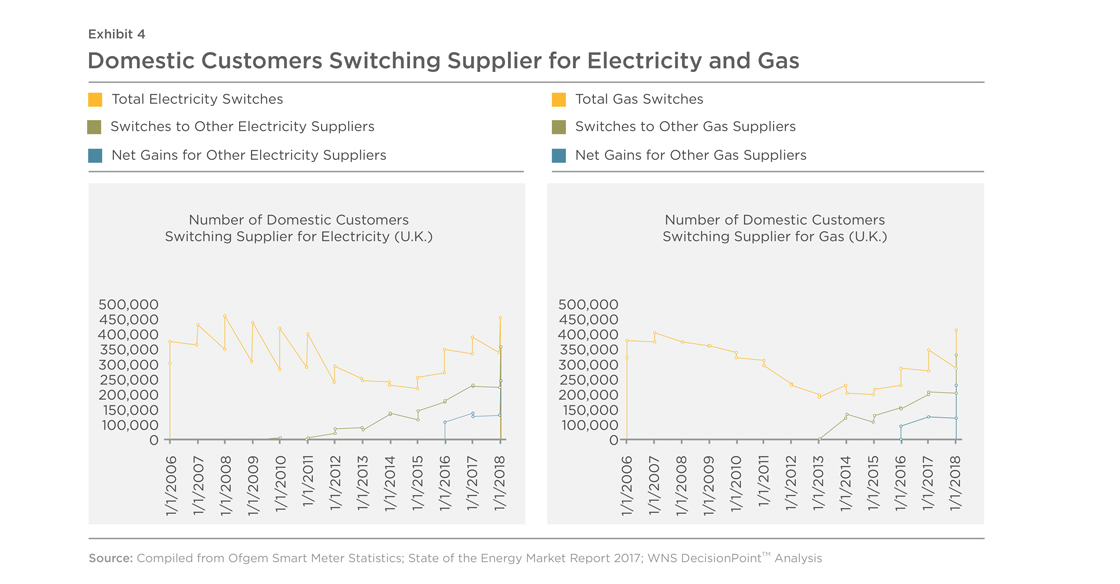
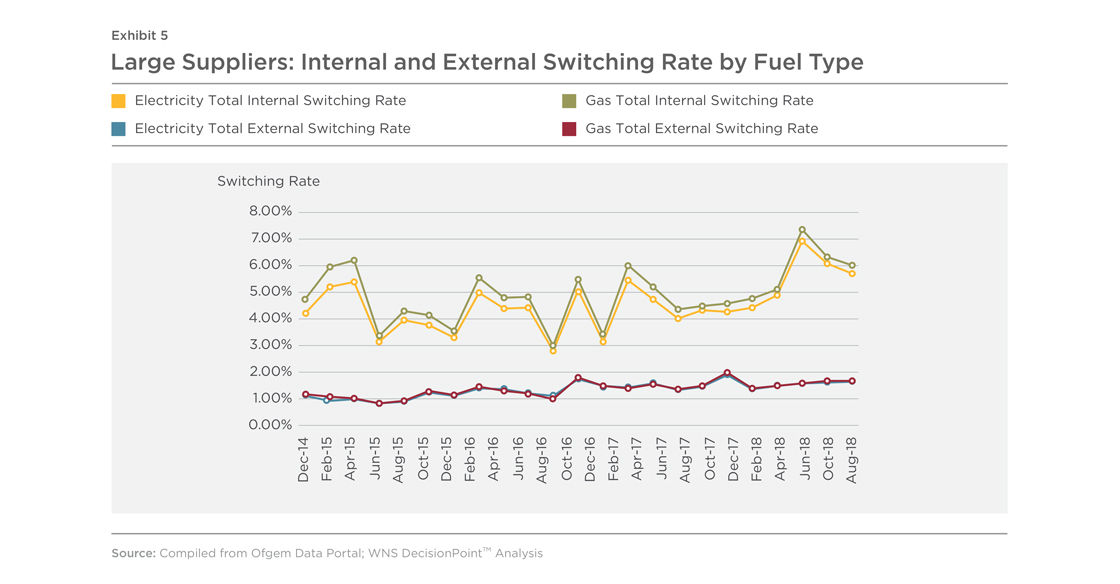
In the coming years, all the major
players are likely to face increasing
competition with more innovative
tariffs and service offerings as the
smart meter program aims to
increase competition through an
engaged and better informed
consumer. However, despite
increasing competition, these
major players still capture a large
market share, and are
spearheading the smart meter
installation through early adoption
of technologies to enhance their
energy management services.
In addition, the entry of many
new players has led to problems
related to unsustainable business
models. Ofgem is working
towards developing more robust
models to ensure the quality of
customer services with reliable and
minimum standards.
As per the estimates in the 2016
report of the BEIS, supplier costs
savings will account for 49 percent
of the smart meter program's
entire GBP 16.7 Billion gross benefit figure.3 Benefits will also be
achieved in terms of energy savings (32 percent of total
benefits), carbon savings and air
quality benefits (8 percent), peak
load shifting (6 percent), and
network-related benefits
(5 percent). To comply with the
smart meter timelines, suppliers
have set individual annual targets
for installation of smart meters.
Monitored by Ofgem, if suppliers
fail to meet their roll-out targets,
they are held accountable for not
being able to meet the stated
targets and are charged fines of up
to 10 percent of their turnover for
non-compliance. A key challenge
for suppliers is securing installation
appointments with customers. For
this, new schemes, incentives and
other engagement approaches
have been proposed by suppliers.
Despite smart meters providing
benefits to the consumer and the
industry, the deployment of nearly
36 million smart meters by the end
of 2020 presents a challenge to
suppliers and is unlikely to be met.
Apart from the installation
deadlines, a few inadequacies have
been reported related to the functionality of smart meters after
the first set was installed. Some of
the meters are reported to be
operating in 'dumb' mode. In other
words, they stop communicating
with the supplier. In some areas,
due to poor mobile connectivity,
nearly 10 percent of smart meters
are not working. The National Audit
Office have also estimated that
70% of SMETS 1 “go dumb” due to
switching. Due to these reasons,
energy suppliers have proposed
installation of smart meters in
around 70 to 75 percent homes
and small businesses by 2020, accepted by Ofgem4. While smart
meters are an upgrade for the
energy ecosystem, consumers need
to be made aware about the
benefits of smart meter roll-out
and made part of the transition.
Overall, policies, customer behavior
and technology are moving the
economy towards a smarter
change. The benefits enabled by
smart meters are likely to be
realized in the long run, with data
playing a key role in every aspect
of decision-making for utilities and
consumers.

PATH TOWARDS SMART FUTURE: BEYOND SMART METERS
The benefits of smart meters may
be realized in a phased manner and
may take some time to cover the
initial costs of installation and
infrastructure. Various studies have
shown that benefits to consumers
through reduction in energy
consumption and better
information on cost is driving
behavioral change and shift in
demand from peak time to off peak
time. The Department of BEIS
estimates that smart meters are
also expected to reduce the
demand on call centers for billing
issues, notching a savings of GBP 2.20 per meter per year and
another GBP 2.2 per year from
better debt management.
Managing and detecting theft will
also be easier for suppliers,
reducing it nearly by 10 percent
and resulting in benefits of GBP
0.29 per meter per annum for
electricity and GBP 0.36 per meter
per annum for gas. Apart from the
immediate benefits of smart
meters, the future of home energy
management will experience
changes with significant
opportunities related to
automation through analytics.
While utilities are currently
focusing on the effective
installation of smart meters, the
next phase for smart utilities is the
management of influx of data and
utilizing it to generate and
maximize benefits from these
technologies. Data management
involves data capturing,
transferring, structuring, storing,
analyzing and visualizing
(Exhibit 6). To smoothen the
transition into new technologies,
utilities are acquiring players in the
analytics domain and gaining early
benefits from these technologies.
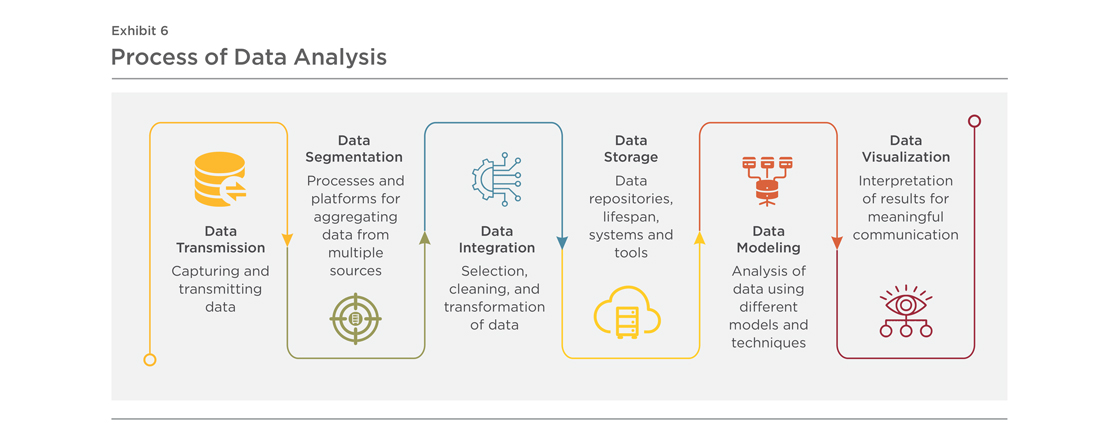
One of the key elements in the rollout
of smart meters is the
development of a centralized smart
metering communications
infrastructure. The metering
infrastructure will ensure that
suppliers, network operators and
consumers receive the necessary
information. In the U.K., this service
is being provided by the Data and
Communications Company (DCC),
a subsidiary of Capita PLC. The
DCC is required to develop a
national smart grid, maintain and
provide smart meter data to
network operators to support the
digitalization of the energy market.
The government and Ofgem are
also launching an Energy Data
Taskforce to use data more efficiently and propose
recommendations to the
stakeholders.
Data will be a critical asset for
businesses. Data-driven insights
will not only improve business
performance but also help
introduce new business models.
Data utilization involves mapping
business needs and requirements
against the various analytical
techniques and tools which will
provide the required output. In
order to realize operational,
financial, customer and strategic
benefits, utilities will have to
institutionalize analytics in business
processes, frameworks and
functions. It is also important to understand the inter-relationships
between business processes. For
instance, customer data could be
used for ramping up billing services
and payment plans, as well as for
improving customer interaction at
each touchpoint. Both require
different data and analysis based
on need – like text analytics for
customer satisfaction and
predictive analytics for payment
collection.
The process of integrating data
analysis with business objectives
comes with the challenge of setting
up methods for data storage,
understanding data complexity and
ensuring data security and privacy.
Once the data processes are
identified and placed in the utility
chain system, businesses will
realize their value / potential and
ease in the decision-making
process. Combining various
analytical techniques will make the
system more intelligent and
efficient. Some energy suppliers
are already using analytics to
analyze consumer data to offer
better services. The big suppliers are at the forefront of adopting
such techniques and are
increasingly using data to forecast
demand and also improve
customer services.
Data-intensive technologies are
going to present opportunities
to uncover new customer patterns,
forecast demand better, prevent
fraud and loss, enhance services
and improve compliance.
The increasing focus on using
data efficiently with smart meter
analytics is going to be the
potential area to explore. Some
of the potential areas of analytics
are customer analytics, grid
analytics, device analytics, work
and asset analytics and advanced
metering infrastructure analytics,
a few of which are discussed in the
table below.
ANALYTICS IN SMART UTILITIES
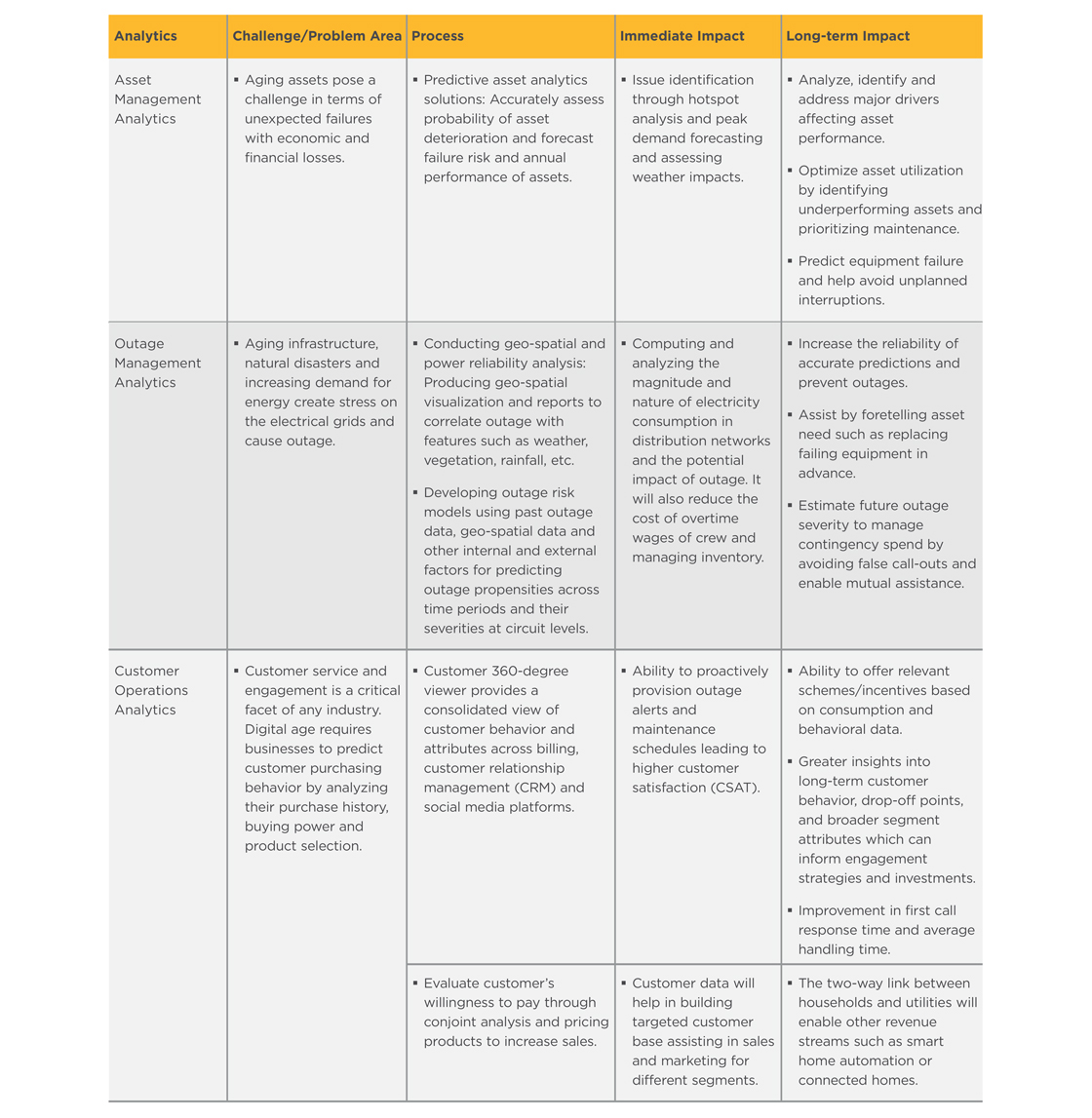
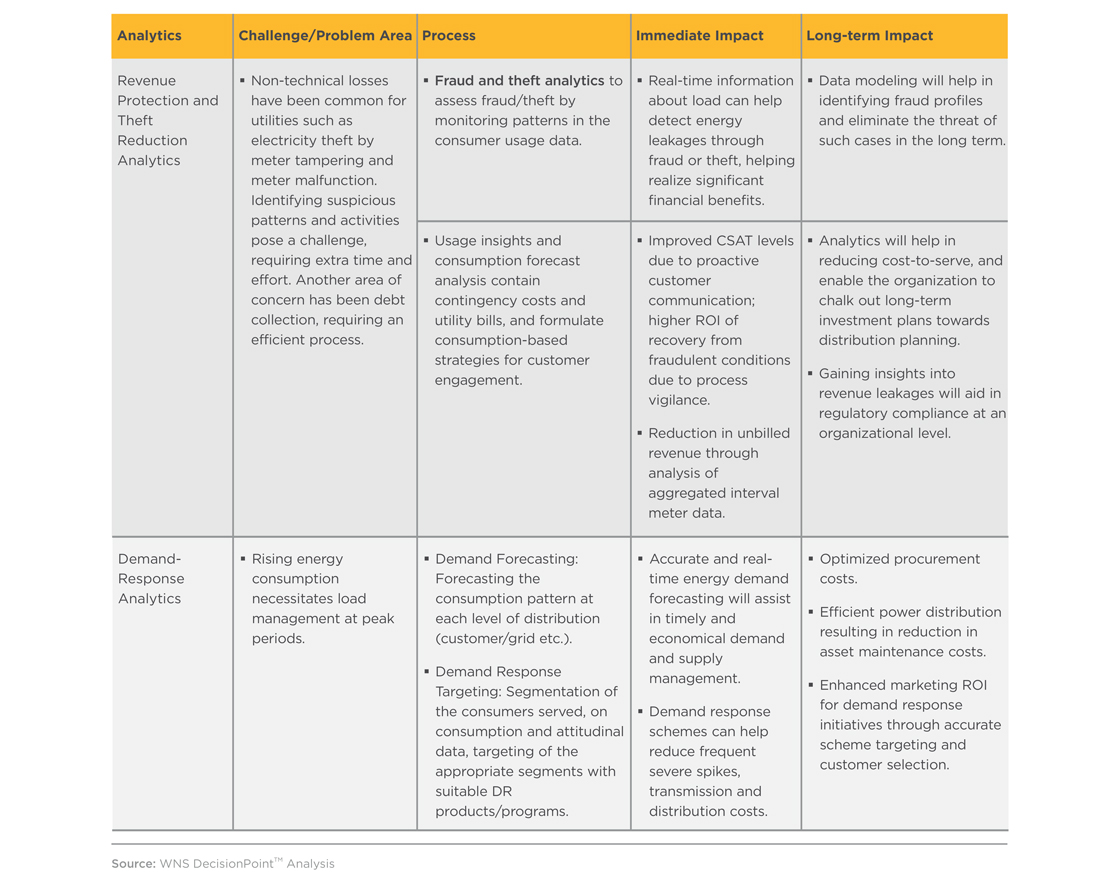
The data-driven era will require
businesses to adapt to new skills
and technologies. This will enhance
business performance leading to
greater efficiency and increased
productivity. The utility industry is evolving and competing in an
environment of changing
government regulations, increased
competition and evolving
consumer demand. Smart utilities
will have to establish mature business processes and analytics.
Aligning their organizational goals
and priorities with the changing
data landscape will help forge a
way for a smart transformation.